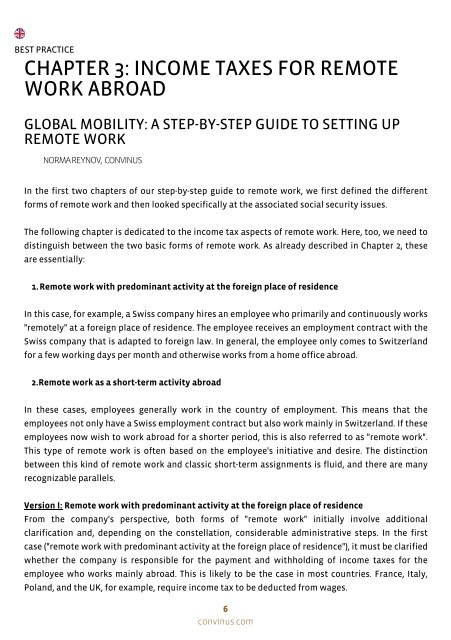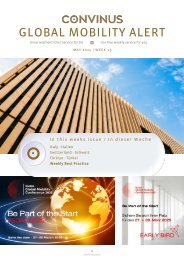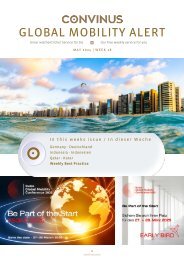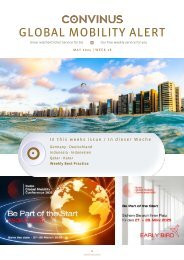CONVINUS Global Mobility Alert - Week 7.2024
Create successful ePaper yourself
Turn your PDF publications into a flip-book with our unique Google optimized e-Paper software.
BEST PRACTICE<br />
CHAPTER 3: INCOME TAXES FOR REMOTE<br />
WORK ABROAD<br />
GLOBAL MOBILITY: A STEP-BY-STEP GUIDE TO SETTING UP<br />
REMOTE WORK<br />
NORMA REYNOV, <strong>CONVINUS</strong><br />
In the first two chapters of our step-by-step guide to remote work, we first defined the different<br />
forms of remote work and then looked specifically at the associated social security issues.<br />
The following chapter is dedicated to the income tax aspects of remote work. Here, too, we need to<br />
distinguish between the two basic forms of remote work. As already described in Chapter 2, these<br />
are essentially:<br />
1.Remote work with predominant activity at the foreign place of residence<br />
In this case, for example, a Swiss company hires an employee who primarily and continuously works<br />
"remotely" at a foreign place of residence. The employee receives an employment contract with the<br />
Swiss company that is adapted to foreign law. In general, the employee only comes to Switzerland<br />
for a few working days per month and otherwise works from a home office abroad.<br />
2.Remote work as a short-term activity abroad<br />
In these cases, employees generally work in the country of employment. This means that the<br />
employees not only have a Swiss employment contract but also work mainly in Switzerland. If these<br />
employees now wish to work abroad for a shorter period, this is also referred to as "remote work".<br />
This type of remote work is often based on the employee's initiative and desire. The distinction<br />
between this kind of remote work and classic short-term assignments is fluid, and there are many<br />
recognizable parallels.<br />
Version I: Remote work with predominant activity at the foreign place of residence<br />
From the company's perspective, both forms of "remote work" initially involve additional<br />
clarification and, depending on the constellation, considerable administrative steps. In the first<br />
case ("remote work with predominant activity at the foreign place of residence"), it must be clarified<br />
whether the company is responsible for the payment and withholding of income taxes for the<br />
employee who works mainly abroad. This is likely to be the case in most countries. France, Italy,<br />
Poland, and the UK, for example, require income tax to be deducted from wages.<br />
6<br />
convinus.com


















